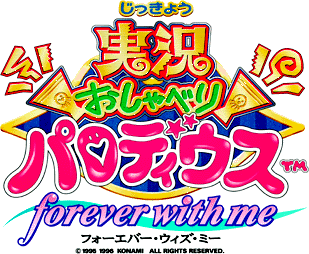
Game: Jikkyō Oshaberi Parodius ~forever with me~
Developer: Konami
Publisher: Konami
Release Date: December 13th, 1996 (Saturn), January 25th, 2007 (PSP)
Genre: Shooter
Systems Available: Saturn, PSX, PSP, Super Famicom
Versions Reviewed: Saturn, PSP
Screenshots: Saturn
There are five proper Parodius games and Jikkyō Oshaberi Parodius ~forever with me~ is the fourth game from the series. While they do not have to be played in any particular order, it does help to start from the beginning so that you would appreciate cameos and other references that appear in all of the games. If you are not familiar with the Parodius series, it is the biggest cute-em-up franchise brought to you by Konami. Parodius mainly parodies Gradius, hence its name. Instead of destroying alien beings and ships, you'll be blasting away cute penguins and school girls. This game contains great stage parodies and appearances by characters from Goemon (Legend of the Mystical Ninja), Lethal Enforcers, Tokimeki Memorial, Xexex, Twin Bee, Bio Miracle, Kid Dracula, and of course, Gradius plus much more. There are also references to non-Konami properties such as Fist of the North Star and parodies of real locations in Japan such as Osaka's Dotonbori. The game's loading screen which reads "Keep Waiting" instead of the boringly proper "Now Loading" sets the mood for the sarcastic hijinks ahead.

And we're off!
As the game's title states, there is 'live' chatting throughout the game. "Jikkyou" means "live" as in "live broadcast" and "oshaberi" is an honorific Japanese term for "chat". The commentary, in Japanese, is funny throughout. Players with an intermediate to advanced knowledge of the Japanese language will enjoy the game even more. It helps a great deal to know random j-pop culture as well. The commentary might be annoying to people who don't understand (it can be turned off), but I don't think it should be a problem to most people. The commentator is mostly commenting on what is going on in the game but also throws in some funny random references to Japanese and world culture. One example is that a popular Japanese maxi pad slogan spoken when you acquire a specific weapon, depending on your character. Maxi pad references in a shooter whose audience is most likely made up of male players? A cheap laugh, but funny, so it works. If you play the game with a 2nd player a female commentator joins in on the action.

16 characters to choose from!
The voice actor in the game, Joji Yanami, mostly works in anime. He is the main narrator of the Dragon Ball movies of the 90s but he has also starred in hundreds of projects from Lupin to Ranma, and my favorite early childhood anime: Gu Gu Ganmo. Some of you may find his voice familiar because he has also lent his voice to games like Ape Escape, Castlevania: Symphony of the Night, and Tales of Destiny. He even had the privilege to be the voices of Gandalf in the Lord of the Rings trilogy, Astro of the Jetsons, Fillmore of Cars, and of Master Splinter in first live action TMNT movie in their Japanese dubs.
The game's story is that an old octopus has a dying wish which he asks his sons to fulfill. Before he dies he would very much like to eat a very rare takoyaki that only appears every 128 years. Your mission is to acquire this takoyaki to satisfy a man's, er, octopus' last wish! That is what it says in the instruction manual, but in the actual opening in the game it is a little different. The goal is to still obtain the rare takoyaki, but 11 friends (But there are 16 selectable characters plus an unlockable Kid Dracula) are sent out on an adventure to not only get the takoyaki, but defeat the evil forces that started a war by giving half of the world's population hemorrhoids (yes, hemorrhoids, you read that right). So it's up to you satisfy a dying cephalopod's last wish and cure the world of their burning butts.

The background is a parody of the Japanese city of Osaka's Dotonbori district.
The first stage begins with a cityscape of Seoul as the commentator says "To all the high school girls of the nation, thanks for waiting! I am your octopus announcer, LET'S GO!" As the first enemy appears the announcer says "Welcome, perverts!" This sets the tone for the rest of the game which is filled with funny comments and creatively wacky enemies. The more of a die hard Konami fan you are, the more you'll enjoy the game. Do not let the game's cute theme fool you. This game is not a walk in the park. There game can be just as challenging and punishing as the Gradius games. Death in this game may feel a bit insulting because the enemy that killed you is most likely a cute penguin or pig dressed in a school girl uniform. Not nearly as dignified as being killed by a huge fire dragon born from a supernova. To add insult to injury the game's commentator says kindly, yet insultingly up on your death: "What the hell was that about?"

Vic Viper killing school girls from Tokimeki!
Like the Gradius games, there is a 'list' or power ups on the bottom of the screen. After destroying specific enemies (usually pink penguins in this game), you can collect a power up capsule (which looks exactly like the capsules in Gradius/Salamander) Each time you collect a power up capsule, the cursor highlighting a power up moves one notch to the right. You can select to manually choose which power ups you'd like or have the computer choose for you. Having the game choose for you helps when during the more manic areas of the game where things are moving fast and you're collecting capsules at a high rate. If you take your eyes off of the screen for half a second, you will not survive. Another power up in the game come in the form of colored bells. If you're familiar with other Parodius games, then you'll recognized them right away. The color of the bell changes when you shoot it. The rule of thumb is to memorize the order in which the bells change colors so that you can always grab the power up you want. They range from doing absolutely nothing to invincibility.
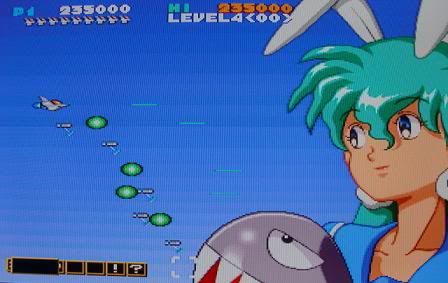
The differences between the PSP and Saturn versions are minimal but noticeable. I haven't played the PSX version, but I am going to assume it is identical to the Saturn version. The biggest difference on the PSP version is the constant slow-down during the more intense parts of the game. Another difference that actually affects game play is the play area on the PSP version is smaller. It is especially noticeable on the 2nd stage boss. In the Saturn version you have a lot of empty space to dodge enemy projectiles, but in the PSP version that area is shrunken quite a bit. Some of the techniques used in the Saturn version won't work with the PSP version, but those instances are few and far between. There also seems to be less commentary on the PSP version. For those who shook their hips to stage 1's music of the Saturn/PSX version will be saddened that KC & the Sunshine Band's 1975 hit "That's The Way I Like It" has been removed from the PSP version. It was replaced by the DDR song: "Brilliant2u".
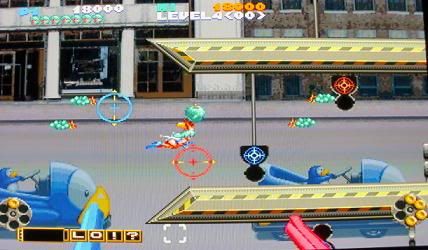
The infamous blue and pink guns from Lethal Enforces use you for target practice.
There are eight stages and almost all of them are a parody of another game. The Tokimeki Memorial stage is fun
The Lethal Enforcers stage is really clever and manic. The game finishes with a replica stage taken right out of Gradius III. The only stage I didn't like too much was stage 5, the parody of stage 2 from the shooter 'Xexex'. Somehow the stage full of 3D polygons in a game that is all 2D sprites didn't flow with the rest of the game and felt very out-of-place. I know they only made it to parody another game, but the stage could have been used to parody a much more mainstream game. This was probably a fan service to hardcore Konami fans or shmup fans.In addition to the main game there are two 'omake' modes, or bonus modes. Omake 1 is a score attack mode and Omake 2 is a mini racing game where the goal is to finish as quickly as you can while collecting power-ups and defeating mini bosses. These bonus modes are not unlockables as they are available right away.
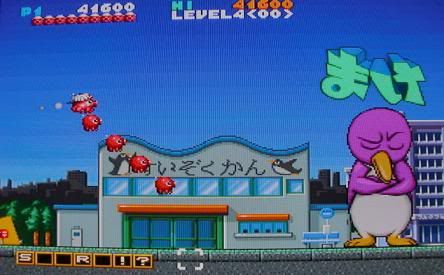
This game has A LOT of penguins in it. It says "Loser" above this penguin's head.
Praises:
This game is one of the better 'simple' shooters I have played. The commentator's voice is funny in of itself. Even if he doesn't say something particularly funny, the way he says it makes it funny. All 16 characters are well-balanced and each one requires you to learn a different strategy of play. The Omake modes are short but add a little more value to an already great game. There are also hidden items which create a fun challenge. Collect 70 fairies and unlock Dracula-kun!
Grievances:
I don't really have any complaints about this game. If I have to choose one then I would say the game could use some more original bosses. Some of the bosses in this game are recycled from older Parodius games. It would have been nice to see what Konami could have come up with by parodying characters from other Konami games instead of giving us the same battles from years prior.

The Verdict:
From beginning to end there are tongue-in-cheek snickers throughout accompanied by beautiful graphics and a great soundtrack make this a must-buy for fans of this genre. The PSP version may be easier to acquire, but both versions are nearly identical so you wouldn't miss out on anything if you choose one over the other. The PSP version is of course a better value because you get all proper installments of Parodius. I am not a fan of cute-em-ups, but this game goes well beyond a cute-em-up and it holds its own among the more serious and elite shooting games, especially in its most difficult setting. It may not be on the level of Harmful Park, but sure ranks up there.
No backups, pirates, or emulation. My copies:
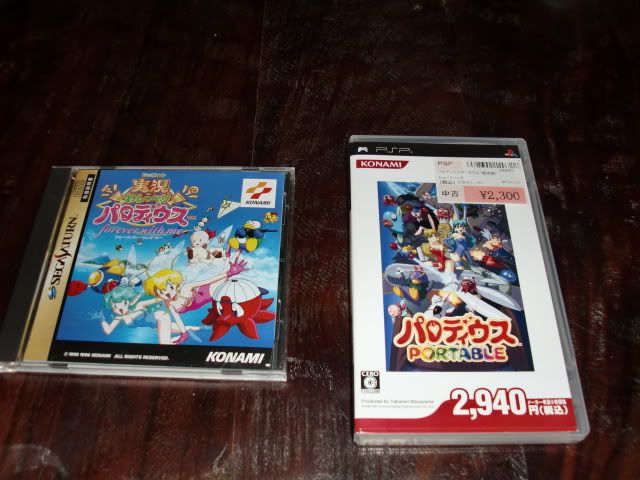

No comments:
Post a Comment